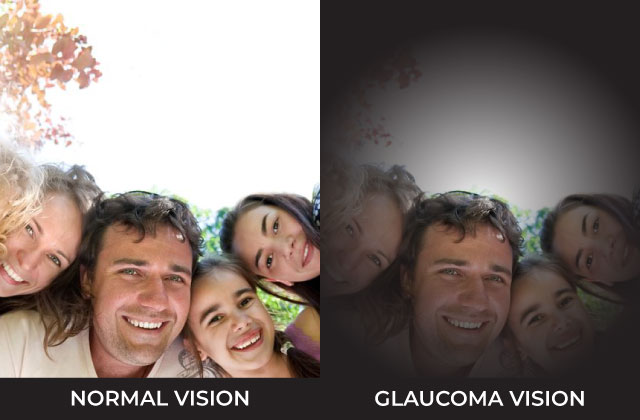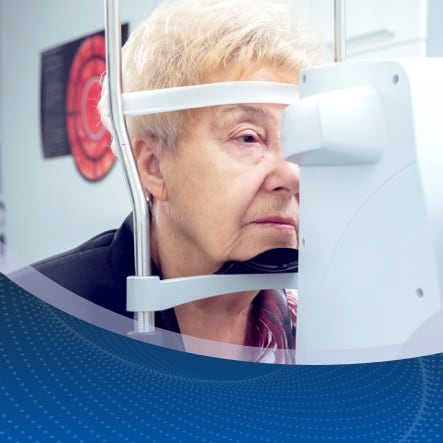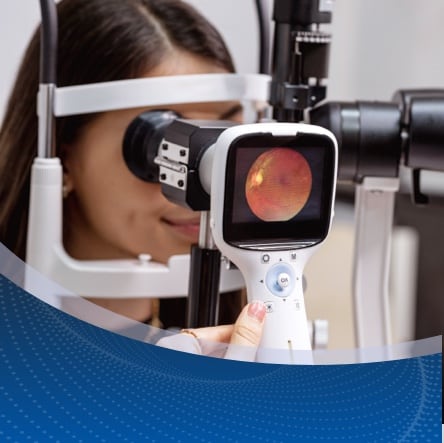Glaucoma damages the optic nerve in the eye and is one of the leading causes of blindness. Approximately 2.7 million Americans aged 40 and older have glaucoma and half of them don’t know they have it. Glaucoma is referred to as the “silent thief of sight” because it develops slowly and can go undetected until it’s too late.
How Does Glaucoma Affect Vision?
The optic nerve is responsible for transmitting images from the eye to the brain. Glaucoma is often, but not always, caused by increased pressure inside the eye, known as intraocular pressure (IOP). The higher the IOP, the greater the risk of optic nerve damage.
As glaucoma develops, it can lead to peripheral vision loss, which is being able to see objects outside of your direct line of sight. Over time, losing peripheral vision can get worse and eventually lead to blindness if left untreated. Central vision, the vision used to read, drive or watch TV, is usually unaffected until the disease is advanced.
Impact of Glaucoma on Your Eyesight
Eyesight can be impacted by glaucoma in several ways, including:
- Loss of Peripheral Vision: Loss of peripheral vision, which is unable to see objects on either side of you or in your peripheral vision.
- Reduced Night Vision: Glaucoma can make it much harder to see in low-light conditions, such as at night or in dimly lit rooms. This happens because glaucoma damages the optic nerve, which carries images from your eyes to your brain. As a result:
1. Slow dark adaptation: Your eyes adjust more slowly when moving from a bright area into a dark environment, so you might find yourself “blind” for longer until your eyes adapt.
2. Reduced contrast sensitivity: It becomes harder to distinguish objects from their background in poor light. Things may appear faded or blend into the darkness.
3. Increased glare: Bright lights, like headlights at night or streetlamps, can feel more blinding and make it tougher to see the road or your surroundings.
4. Peripheral vision loss: Loss of side vision (a hallmark of glaucoma) means you might not see hazards or objects off to the side in low light, further complicating night navigation.
Many people with glaucoma report difficulty driving at night or moving around in dark rooms because of these vision changes.
- Tunnel Vision: In severe cases, glaucoma can lead to tunnel vision, which is the loss of peripheral vision in both eyes. This can make it challenging to navigate your surroundings or perform everyday tasks.
DOES GLAUCOMA CAUSE NIGHT BLINDNESS?
Glaucoma typically does not cause complete night blindness (the total inability to see in the dark). True night blindness is more often associated with certain retinal conditions (like retinitis pigmentosa) or severe vitamin A deficiency. However, glaucoma can create a similar feeling for patients by significantly worsening their night vision.
Because glaucoma affects contrast sensitivity and peripheral vision, a person with advanced glaucoma might feel nearly “night blind” in very dim settings. They still have some vision, but the combination of tunnel vision and poor contrast makes it extremely challenging to see at night. If you have glaucoma and notice that you’re struggling more than before in low light, mention it to your eye doctor. It could be a sign that the disease has progressed, and your doctor may adjust your treatment or advise strategies to help with your night vision.
TIPS TO MANAGE NIGHT VISION PROBLEMS WITH GLAUCOMA
While there’s no cure for glaucoma, you can take steps to cope with its effects on your night vision:
- Use anti-glare lenses: Glasses with anti-reflective (AR) coating or special yellow-tinted nighttime driving glasses can reduce headlight glare.
- Improve lighting at home: Make sure halls and rooms are well-lit. Using brighter bulbs or nightlights can help you move around more safely in the dark.
- Avoid sudden bright lights: Try not to look directly at oncoming headlights or harsh lamps. If you get temporarily blinded by a bright light, pause and give your eyes a moment to readjust.
- Maintain a vision-friendly diet: Nutrients like vitamins A, C, and E, plus zinc, support overall eye health. While a healthy diet won’t cure glaucoma, eating leafy greens, carrots, fish, and other nutrient-rich foods can help keep your eyes as healthy as possible.
These adjustments, along with diligently following your glaucoma treatment plan (like using your prescription eye drops and attending regular check-ups), can help maximize your remaining vision and make nighttime a bit easier to navigate.
Treatment Options for Glaucoma
Unfortunately, the progression of glaucoma is permanent and cannot be reversed. However, proper glaucoma treatment can inhibit further damage. The purpose of these treatments is to lower the pressure in the eyes (IOP) and prevent more damage to the optic nerve. Treatments for glaucoma include:
- Eye Drops: Ophthalmologists or eye doctors typically prescribe this treatment first. The eye drops reduce the eye pressure.
- Laser Surgery: Laser surgery is also used to treat glaucoma. This procedure can lower IOP by improving the fluid drainage in the eye. There are several types of laser surgery available, including trabeculoplasty and iridotomy.
- Microsurgery: Microsurgery or trabeculectomy, involves creating a new drainage channel to lower IOP. This procedure is typically used in more severe glaucoma cases.
Glaucoma is a serious eye condition that can lead to vision loss and blindness if left untreated. The American Academy of Ophthalmology recommends that healthy adults get a comprehensive eye exam by age 40 to screen for eye diseases. It’s important to have regular eye exams to detect glaucoma early, especially if you have a family history of glaucoma.
For more details or to schedule a visit, please book an appointment with Griffey Eye Care and Laser Center or reach out to us at (757) 410-9500.












